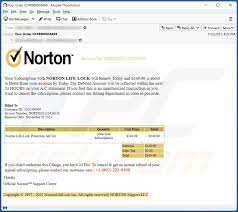Do you trust the email identity protection scam from Norton Lifelock? Is this a legitimate annual product membership email? This review will provide details about the Norton Lifelock email scam.
FTC states that online scams are the second most common type of fraud in 2021. We have taken responsibility for reviewing products, stores and websites as well as mails, etc. Our reader’s financial security.
How does Norton Lifelock Scam Email work?
Scammers send Norton Lifelock emails with the intent of stealing personal information. These emails are intended to defraud the victims. This mail is from an unknown source and it contains the following information: “Anual product membership” has been renewed to a Norton product. It contains links and offers to purchase or renew other security services or antiviruses. Be careful, there are other phishing websites that can be used to deceive and lure unsuspecting victims.
Many mails and texts claiming to be from NortonLifeLock try to instil a sense of urgency. They threaten to charge your credit card if you don’t respond. You may also receive warnings about your computer’s infected status or expired antivirus settings. Many include an urgent request to contact someone. They may ask the reader to log on to a spoof website, open an attachment or call an 800 number.
Many scam emails look similar to renewal notices. They state that your credit card will not be charged unless you call the listed number. Spam emails containing Norton, LifeLock or NortonLifeLock names often contain links that offer fake security services or products. These links don’t lead to legitimate NortonLifeLock sites, but to scammers’ websites. Some links will lead you to install malware onto your computer.
What to do if you receive an email from Norton Lifelock Scam:
- Do not click on any link.
- Do not use the number contained in an email or text. You can find the phone number of the company who sent the message online if you need to reach them.
Summary:
All indications point to scammers using Norton lifelock as a disguise in order to defraud individuals and obtain personal information.






